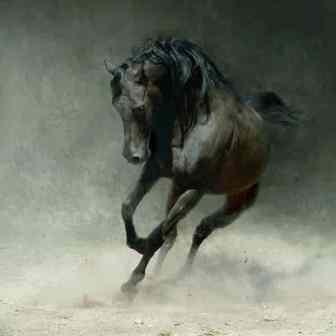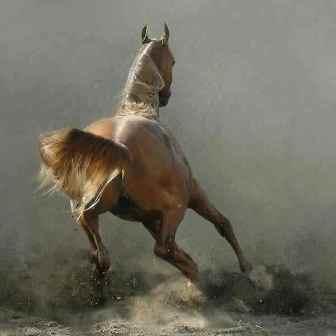|
restoring our biblical and constitutional foundations
|
My Horses, My Teachers
At church last Sunday I was kvetching with a fellow philippos about why we love horses so much. Our conversation was a nice break from the nattering and negativity of politics and world events. My horses were always infinitely patient with me and unstintingly generous. I could never have ventured into the joys of Equestrian Society without two very cool-minded hot-blooded geldings.
I’m grateful for what my horses taught me during my all-too-brief 15 year riding career. In the early 1990s our family went to wide and breezy Montana on a camping trip and we passed through Cody, Wyoming on the way. One visit to the local rodeo in Cody and I was hooked on horse flesh. I was a little disappointed to discover that my first horse – an excitable 6 year-old Arabian I had naively bought – was the kind of breed that led to a high number of unplanned dismounts. But eventually Cody and I became a glaring contradiction to the old saw, “You can’t teach an old dog new tricks” (the “dog” in this case being yours truly).
If anybody needed lots of help in learning to ride it was klutzy old me. Horses walk, trot, and canter intuitively. They are, unlike us humans, notoriously allergic to introspection and analysis. In our riding ring in La Mirada, I fretted that I would never learn to ride as good as Cody could perform his gaits. But eventually all those circuits paid off. Once we moved to North Carolina I could take Cody or Traveler on long rides in the countryside, demonically steering them from field to field as fast as we could go. Galloping Traveler along Hwy 15 always got a delighted horn blast from the passing truckers, while Cody’s dressage movements in our pasture provoked only silent wonder. I’d still be at it today had I not had to make a choice between farming and riding. I simply don’t have the strength or energy to do both any more.
I’ve rummaged around in my mental attic and come up
with a few lessons I’ve been taught by my sterling steeds. I’m sure that
they never knew they were the tutors and I was their pupil. I may have
been quite firmly running the show, but they were the stars. For one
thing, on horseback you can forget your stuffed résumé. Poor horsemanship
can’t be hidden by bluff or bluster. At times I found the
 experience
of watching myself fail very painful. More than anything, I suppose, I was
learning stick-with-it-ness, a virtue required far beyond the world of
horsemanship. I often wonder what my horses thought about me. Believe it
or not, I always tried to treat them like I imagine Jesus tries to treat
us. It begins with a profound understanding of the horse – of his place
and purpose in creation, of his natural excitableness, of his love of
companionship. It continues with patient and caring horsemanship that
regards discipline as the basis for a successful partnership between horse
and rider. A good rider is never a whip-wielding dictator, even though he
might carry a riding crop (as I usually did). A horse’s energies and
talents are best developed by following the pattern of nature – never by
involving force.
experience
of watching myself fail very painful. More than anything, I suppose, I was
learning stick-with-it-ness, a virtue required far beyond the world of
horsemanship. I often wonder what my horses thought about me. Believe it
or not, I always tried to treat them like I imagine Jesus tries to treat
us. It begins with a profound understanding of the horse – of his place
and purpose in creation, of his natural excitableness, of his love of
companionship. It continues with patient and caring horsemanship that
regards discipline as the basis for a successful partnership between horse
and rider. A good rider is never a whip-wielding dictator, even though he
might carry a riding crop (as I usually did). A horse’s energies and
talents are best developed by following the pattern of nature – never by
involving force.
As in the Christian life, progress in riding can be painfully gradual. The beginner makes rapid improvement and can feel himself advance with each ride. Then the law of diminishing returns kicks in. For the next two or three years the rider must learn how to sit and manage his horse and learn to ride the walk, trot, and canter. Then he can begin jumping and advanced riding. Progress is slow and gradual. Too rapid progress often leads to mistakes and bad habits that are very difficult to overcome. Riding, like living the Christian life, is a persistent and consistent endeavor. The rider must develop a “feel” so that he knows exactly what his horse is doing under him at all times. His actions and reactions must become instinctive. He must never be careless or inattentive to his horse.
Xenophon was right when he said, “Be kind to your
horse. Do not be rough and tough with him. Try to show him.” Horses have a
right to a fair deal, like people and even nations. Especially if we are
at odds with them. We must show people what we expect and give them time
to understand. If the horse
 is
to understand you, you must give your aids consistently. In correcting a
fault you must try hard to avoid a fight with your horse because he may
win. Learn to accept the least concession and quit for the day. Do this
gradually and you are in for a treat. Eventually the horse will feel your
thoughts through your body. Cody and I were so fully trained that I merely
had to think and he did it. But we must proceed slowly through all the
lessons or the horse will become upset and break down.
is
to understand you, you must give your aids consistently. In correcting a
fault you must try hard to avoid a fight with your horse because he may
win. Learn to accept the least concession and quit for the day. Do this
gradually and you are in for a treat. Eventually the horse will feel your
thoughts through your body. Cody and I were so fully trained that I merely
had to think and he did it. But we must proceed slowly through all the
lessons or the horse will become upset and break down.
Why does the rider do all this hard work? Why does he apply all this concentration? Only because he believes that, in the end, it will all be worthwhile, repaid by the joy and infinite satisfaction that comes by riding a well-trained and obedient horse. His enjoyment is no longer vicarious. He now has experienced personal success as the result of his labors. He has felt the harmony and thrill of being one with a horse that is doing its very best for him.
I’ll not bore you with any more analogies. If you aren’t a horse person you are probably shaking your head about now. I can identify with you, believe me. That a surfer from Hawaii should have ever become an avid equestrian is a plot twist worthy of Arthur Conan Doyle. It’s hard for me to fathom what my world would have been like without Cody and Traveler. At the very least I hope they taught me a bit of humility and patience. I suppose these lessons could also be applied on the national level. As America enters Operation Eternal War, we will have to decide whether we will lead by fear, aggression, and force of arms or by diplomacy, moderation, and example.
October 2, 2007
David Alan Black is the editor of www.daveblackonline.com and the former owner of an Arabian named Cody and a thoroughbred named Traveler (shown below).